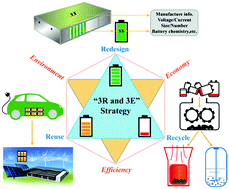当前位置:
X-MOL 学术
›
Chem. Soc. Rev.
›
论文详情
Our official English website, www.x-mol.net, welcomes your
feedback! (Note: you will need to create a separate account there.)
Toward sustainable and systematic recycling of spent rechargeable batteries
Chemical Society Reviews ( IF 40.4 ) Pub Date : 2018-08-20 00:00:00 , DOI: 10.1039/c8cs00297e Xiaoxiao Zhang 1, 2, 3, 4, 5 , Li Li 1, 2, 3, 4, 5 , Ersha Fan 1, 2, 3, 4, 5 , Qing Xue 1, 2, 3, 4, 5 , Yifan Bian 1, 2, 3, 4, 5 , Feng Wu 1, 2, 3, 4, 5 , Renjie Chen 1, 2, 3, 4, 5
Chemical Society Reviews ( IF 40.4 ) Pub Date : 2018-08-20 00:00:00 , DOI: 10.1039/c8cs00297e Xiaoxiao Zhang 1, 2, 3, 4, 5 , Li Li 1, 2, 3, 4, 5 , Ersha Fan 1, 2, 3, 4, 5 , Qing Xue 1, 2, 3, 4, 5 , Yifan Bian 1, 2, 3, 4, 5 , Feng Wu 1, 2, 3, 4, 5 , Renjie Chen 1, 2, 3, 4, 5
Affiliation

|
Ever-growing global energy needs and environmental damage have motivated the pursuit of sustainable energy sources and storage technologies. As attractive energy storage technologies to integrate renewable resources and electric transportation, rechargeable batteries, including lead–acid, nickel–metal hydride, nickel–cadmium, and lithium-ion batteries, are undergoing unprecedented rapid development. However, the intrinsic toxicity of rechargeable batteries arising from their use of toxic materials is potentially environmentally hazardous. Additionally, the massive production of batteries consumes numerous resources, some of which are scarce. It is therefore essential to consider battery recycling when developing battery systems. Here, we provide a systematic overview of rechargeable battery recycling from a sustainable perspective. We present state-of-the-art fundamental research and industrial technologies related to battery recycling, with a special focus on lithium-ion battery recycling. We introduce the concept of sustainability through a discussion of the life-cycle assessment of battery recycling. Considering the forecasted trend of a massive number of retired power batteries from the forecasted surge in electric vehicles, their repurposing and reuse are considered from economic, technical, environmental, and market perspectives. New opportunities, challenges, and future prospects for battery recycling are then summarized. A reinterpreted 3R strategy entailing redesign, reuse, and recycling is recommended for the future development of battery recycling.
中文翻译:

致力于可持续和系统地回收废旧充电电池
不断增长的全球能源需求和环境破坏推动了对可持续能源和存储技术的追求。作为整合可再生资源和电力运输的有吸引力的储能技术,包括铅酸,镍金属氢化物,镍镉和锂离子电池在内的可充电电池正经历着空前的快速发展。但是,可充电电池因使用有毒材料而引起的内在毒性可能对环境有害。另外,电池的大量生产消耗大量资源,其中一些是稀缺的。因此,在开发电池系统时必须考虑电池回收。在这里,我们从可持续的角度提供了可充电电池回收的系统概述。我们提供与电池回收相关的最新基础研究和工业技术,尤其是锂离子电池回收。通过讨论电池回收的生命周期评估,我们介绍了可持续性的概念。考虑到预测的电动汽车激增将导致大量退休动力电池的趋势,从经济,技术,环境和市场的角度考虑其用途和再利用。然后总结了电池回收的新机遇,挑战和未来前景。对于电池回收的未来发展,建议重新解释的3R策略要求重新设计,重复使用和回收。特别关注锂离子电池的回收利用。通过讨论电池回收的生命周期评估,我们介绍了可持续性的概念。考虑到预测的电动汽车激增将导致大量退休动力电池的趋势,从经济,技术,环境和市场的角度考虑其用途和再利用。然后总结了电池回收的新机遇,挑战和未来前景。对于电池回收的未来发展,建议重新解释的3R策略要求重新设计,重复使用和回收。特别关注锂离子电池的回收利用。通过讨论电池回收的生命周期评估,我们介绍了可持续性的概念。考虑到预测的电动汽车激增将导致大量退休动力电池的趋势,从经济,技术,环境和市场的角度考虑其用途和再利用。然后总结了电池回收的新机遇,挑战和未来前景。对于电池回收的未来发展,建议重新解释的3R策略要求重新设计,重复使用和回收。考虑到预测的电动汽车激增将导致大量退休动力电池的趋势,从经济,技术,环境和市场的角度考虑其用途和再利用。然后总结了电池回收的新机遇,挑战和未来前景。对于电池回收的未来发展,建议重新解释的3R策略要求重新设计,重复使用和回收。考虑到预测的电动汽车激增将导致大量退休动力电池的趋势,从经济,技术,环境和市场的角度考虑其再利用和再利用。然后总结了电池回收的新机遇,挑战和未来前景。对于电池回收的未来发展,建议重新解释的3R策略要求重新设计,重复使用和回收。
更新日期:2018-08-20
中文翻译:

致力于可持续和系统地回收废旧充电电池
不断增长的全球能源需求和环境破坏推动了对可持续能源和存储技术的追求。作为整合可再生资源和电力运输的有吸引力的储能技术,包括铅酸,镍金属氢化物,镍镉和锂离子电池在内的可充电电池正经历着空前的快速发展。但是,可充电电池因使用有毒材料而引起的内在毒性可能对环境有害。另外,电池的大量生产消耗大量资源,其中一些是稀缺的。因此,在开发电池系统时必须考虑电池回收。在这里,我们从可持续的角度提供了可充电电池回收的系统概述。我们提供与电池回收相关的最新基础研究和工业技术,尤其是锂离子电池回收。通过讨论电池回收的生命周期评估,我们介绍了可持续性的概念。考虑到预测的电动汽车激增将导致大量退休动力电池的趋势,从经济,技术,环境和市场的角度考虑其用途和再利用。然后总结了电池回收的新机遇,挑战和未来前景。对于电池回收的未来发展,建议重新解释的3R策略要求重新设计,重复使用和回收。特别关注锂离子电池的回收利用。通过讨论电池回收的生命周期评估,我们介绍了可持续性的概念。考虑到预测的电动汽车激增将导致大量退休动力电池的趋势,从经济,技术,环境和市场的角度考虑其用途和再利用。然后总结了电池回收的新机遇,挑战和未来前景。对于电池回收的未来发展,建议重新解释的3R策略要求重新设计,重复使用和回收。特别关注锂离子电池的回收利用。通过讨论电池回收的生命周期评估,我们介绍了可持续性的概念。考虑到预测的电动汽车激增将导致大量退休动力电池的趋势,从经济,技术,环境和市场的角度考虑其用途和再利用。然后总结了电池回收的新机遇,挑战和未来前景。对于电池回收的未来发展,建议重新解释的3R策略要求重新设计,重复使用和回收。考虑到预测的电动汽车激增将导致大量退休动力电池的趋势,从经济,技术,环境和市场的角度考虑其用途和再利用。然后总结了电池回收的新机遇,挑战和未来前景。对于电池回收的未来发展,建议重新解释的3R策略要求重新设计,重复使用和回收。考虑到预测的电动汽车激增将导致大量退休动力电池的趋势,从经济,技术,环境和市场的角度考虑其再利用和再利用。然后总结了电池回收的新机遇,挑战和未来前景。对于电池回收的未来发展,建议重新解释的3R策略要求重新设计,重复使用和回收。











































 京公网安备 11010802027423号
京公网安备 11010802027423号